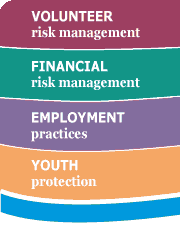Preventing False Accusations of Child Sexual Abuse
Recently there was a story in The Washington Post about a Montgomery County, MD schoolteacher who had been accused of inappropriate sexual behavior by seven sixth grade students. The teacher was immediately suspended and his life was turned upside down. Upon closer investigation, it was revealed that one of the students, upset over being disciplined, recruited the other students and concocted the story. It took more than a month to clear the teacher. Removing the stigma associated with his name may take much longer.
This type of event should be of concern to anyone who works on a paid or volunteer basis with children. Here are some of the guidelines that various organizations have implemented to protect both children from the threat of abuse and adults from false accusations.
- Avoid situations in which you are alone with a child. When it is necessary to speak privately with a child, find a place out of earshot, but within sight of others for your conference. This includes not transporting youngsters alone in your car.
- The privacy of children in situations such as toileting, showering and changing clothes should be respected. When it is necessary to supervise children in these situations, at least two adults should be present and intrude only to the extent that the health and safety of the children require. Adult volunteers should preserve their own privacy in these situations also.
- Avoid touching areas that are normally covered by swimming suits: breasts, buttocks, and groin. When hugging is appropriate, hug from the side over the shoulders, not from the front.
- Sexual jokes, comments of a sexual nature, kissing, sensual massages or sexual gestures are not appropriate behavior for an adult staff member or volunteer.
- When volunteering to supervise overnight activities, adults should not share sleeping quarters with children other than their own.
- Revealing personal information about one's sex life by an adult volunteer or staff member is never appropriate.
- Do not use corporal punishment in any form — spanking, slapping, hitting, etc.
It is the adult's responsibility to set and respect boundaries. When a child attempts to involve an adult in inappropriate behavior, the adult must reject the overture.
Of course, as horrendous as the false accusation was, organizations must take seriously every allegation of abusive behavior by its volunteers or employees and request an investigation by the appropriate child protection agency. As in the case in Montgomery County, investigations by qualified personnel will eventually reveal the truth.
Vital Signs published by the Nonprofit Risk Management Center offers additional information and guidelines for organizations. For more information click here.
© 2003 Nonprofit Risk Management Center






